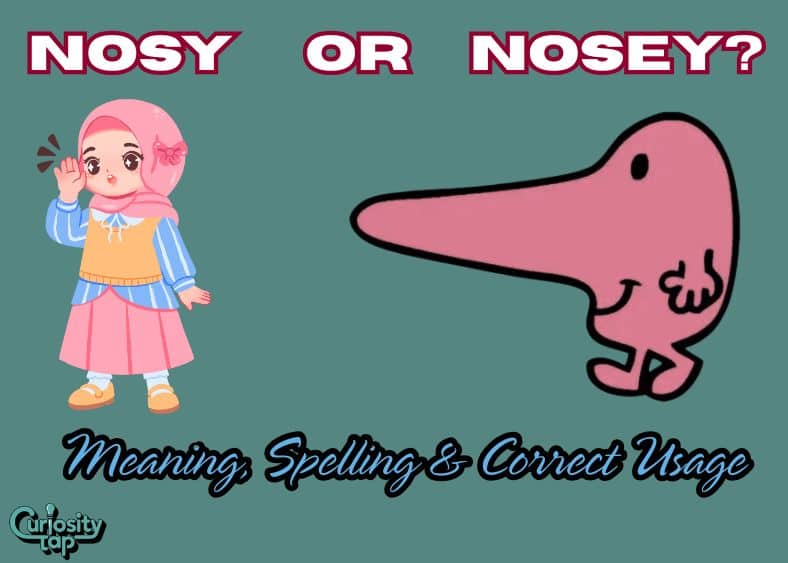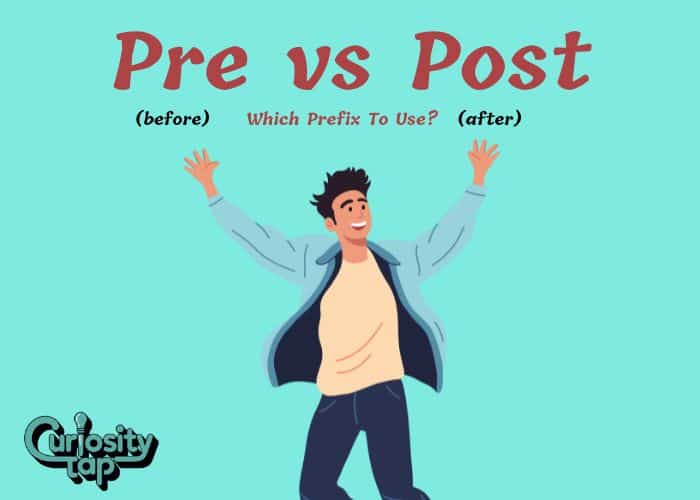Language is full of tricky word choices that make even confident writers pause. One such head-scratcher is whether to use nosy or nosey. You’ve probably seen both spellings in books, online articles, or even text messages.
But which one is actually correct? And does it matter if you use one over the other?
This article dives deep into the nosy vs nosey debate, clears up the confusion, and helps you understand how to use the word confidently in any context.
What Does Nosy Mean?
At its core, nosy describes someone who is overly interested in other people’s private affairs. Think of the neighbor peeking through their curtains, or the coworker who just can’t resist asking personal questions.
- Part of speech: Adjective
- Meaning: Excessively curious about other people’s matters.
- Example: My nosy neighbor keeps asking about my weekend plans.
Usage in Modern English
According to Merriam-Webster and Oxford English Dictionary, nosy (without the extra “e”) is the standard and preferred spelling in both American and British English.
The Variant: Nosey
So, where does nosey come from? Interestingly, it isn’t a “wrong” spelling in the strictest sense it’s simply a less common variant.
Popularity of “Nosey”
- Historically, “nosey” was used in older British texts as a playful variant.
- In modern English, “nosey” is often seen in informal writing, such as personal blogs, social media, or regional dialects.
- Data from Google Ngram Viewer shows that nosy is far more dominant in usage today.
Example: She’s a bit nosey when it comes to my relationships.
Also Read:
Loosing or Losing: Which Spelling Is Correct?
Exception vs Exemption: Key Differences Explained
Happened or Happend: Is It This or That?
Which Is Correct: Nosy or Nosey?
The short answer: Nosy is the correct and widely accepted spelling in professional, academic, and formal writing.
However:
- Nosey is not “wrong,” but it’s considered informal and far less common.
- If you’re writing for business, academic work, or publishing, always choose nosy.
- In casual texts or regional writing, “nosey” may appear, but it’s best avoided in professional contexts.
Real-Life Example: The Office Gossip
Picture this: Jane works in a corporate office and has a colleague named Tom. Tom has a reputation for being nosy. Whenever someone whispers in the break room, he finds a way to insert himself into the conversation.
One day, Jane was quietly discussing her upcoming job interview with a trusted coworker. Before she knew it, Tom chimed in:
“So where’s the interview? Which company? Are they paying more?”
Jane felt uncomfortable this was personal information she hadn’t chosen to share. This scenario highlights why being labeled nosy is rarely flattering.
Checklist: When to Use Nosy vs Nosey
| Context | Correct Choice | Why it Works |
|---|---|---|
| Academic paper | Nosy | Standard, accepted spelling |
| Business email | Nosy | Professional tone |
| Social media post | Either | Casual context allows variants |
| British dialect blog | Nosey (optional) | Regionally accepted but informal |
| Formal journalism | Nosy | Clarity and correctness matter |
Pros & Cons of Each Spelling
Nosy
Pros:
- Accepted globally in formal and informal contexts.
- Recognized by all major dictionaries.
- Avoids confusion in professional writing.
Cons:
- May look “shortened” to readers used to “nosey.”
Nosey
Pros:
- Adds a quirky, informal tone.
- Sometimes preferred in casual British writing.
Cons:
- Not standard in professional contexts.
- Less searchable online (lower SEO recognition).
FAQs
Is “nosey” ever correct?
Yes, “nosey” is a variant spelling, but nosy is the preferred and correct form in modern English.
Do dictionaries list both spellings?
Most major dictionaries (Oxford, Merriam-Webster, Cambridge) list nosy as the primary spelling, sometimes noting “nosey” as a variant.
Is “nosy” always negative?
Typically, yes it implies unwelcome curiosity. However, in casual speech, it can be softened: “She’s a bit nosy, but that’s just her nature.”
Do Americans and Brits use different spellings?
Not really. Both primarily use nosy today. “Nosey” appears occasionally in British informal writing
Should I correct someone who writes “nosey”?
In formal writing, yes. In casual texts, it’s usually unnecessary unless clarity matters.
Conclusion
When in doubt, always choose nosy. It’s the standard spelling, recognized worldwide, and avoids any impression of informality or error.
“Nosey” may pop up here and there, but it’s best reserved for casual, playful, or regionally flavored writing.
👉 Next time you draft an email, report, or article, remember: nosy wins the debate.
Call to Action
Want to sharpen your English and write successfully every time?
Check out our Grammar Checker Tool and never second-guess your spelling again!
Read our guide on Common English Misspellings to boost your skills even further.
Sources List
Sources:
- Merriam-Webster Dictionary. (2025). Nosy. Retrieved from https://www.merriam-webster.com/dictionary/nosy
- Oxford English Dictionary. (2025). Nosy/Nosey. Retrieved from https://www.oed.com
- Google Ngram Viewer. (2024). Nosy vs Nosey usage trends. Retrieved from https://books.google.com/ngrams
Read more knowledgeable blogs on Curiosity Tap
Is this article helpful?

Jackson Pearson is a passionate educator and language enthusiast behind the blog Jackson Pearson. With years of experience in teaching and writing, he specializes in simplifying complex grammar rules, breaking down tricky vocabulary, and crafting learning guides that are both engaging and practical. His mission is to help readers boost their English skills whether they’re beginners or brushing up for fluency. Through every article, Jackson brings clarity, structure, and a spark of curiosity to the world of English learning.



